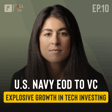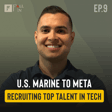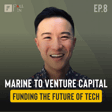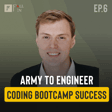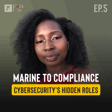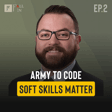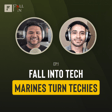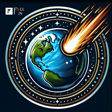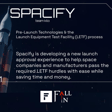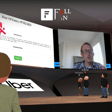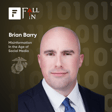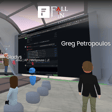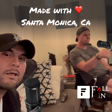Become a Creator today!Start creating today - Share your story with the world!
Start for free
00:00:00
00:00:01

Fall Into Tech #7: Tony Herrera - Navy to AI Machine Learning Engineer
Navy veteran Tony Herrera shares his journey from corpsman to AI machine learning engineer in this fascinating episode.
Discover:
- Tony's career evolution from Navy corpsman to coding bootcamp graduate, and his rapid progression to AI engineering roles
- Insights into the challenges and rewards of transitioning from front-end development to machine learning and cognitive AI technologies
- How military skills like adaptability, leadership, and tenacity translate to success in the tech industry, especially in cutting-edge fields
- The day-to-day realities of working on large-scale AI projects
- Tony's advice for aspiring tech professionals, emphasizing the importance of understanding fundamental concepts and continuous learning
Whether you're a transitioning service member or curious about AI and machine learning, this episode offers valuable insights into succeeding in the cutting-edge world of cognitive technologies and software development.
GUEST INFO:
EPISODE LINKS:
- Skill Distillery Coding Bootcamp
- Coursera
- Operation Code
- Meta Llama AI Model
- TensorFlow
- PyTorch
- Jax
- GI Bill
- Navy Enterprise Service Desk
PODCAST INFO:
- Podcast website: https://www.fallintotech.com/
- Youtube
- Apple Podcast
- Spotify
- Zencastr
SOCIAL MEDIA:
HOST INFO:
Transcript
Introduction to Hosts and Guest
00:00:03
Michael Rodriguez
Welcome back to the Fall into Tech podcast hosted by myself, Michael Rodriguez, and my co-host, Jamil Matin. Two Marines turned techies on this podcast. We chat with fellow vets about their journey from military to tech, as well as other technology professionals to help you with your tech career.
00:00:21
fall_in
Yeah, Tune In Weekly. We're pumping out podcasts every single week. So definitely tune in for guest interviews where we discuss you know specific tech roles, career paths, and tips for succeeding in tech. And this week, we have Tony Herrera. Thanks for joining us, man.
00:00:41
Tony Herrera
Yeah, absolutely. Great to be here.
00:00:44
fall_in
Yeah, so Tony, to give everyone his background, he's a Navy corpsman turned machine learning engineer. I think I first met Tony when I was mentoring him when he was first breaking into tech. So it's great to see him level up and see his career evolved. So yeah, we kind of like to break the ice, Tony. So do you have a fun fact about yourself that you can share with the audience here?
00:01:08
Tony Herrera
Yeah, it's it's it's fun, but probably in a different way. Kind of fun, right? As we know in the military, it's fun but different. So I still like running. I still like being active. And I've actually got myself, you know, my wife thinks I'm crazy, but doing a half marathon here, Veterans Day, November 11th. down in Coronado Island. It's the Silver silver Shores, half marathon, so just kind of getting after it, you know, and still doing just the crazy thing day in day out. So yeah, fun but different.
00:01:42
Michael Rodriguez
Nice. Yeah, and Jamil mentioned you were Navy Corpsman. Jamil and I were Marines. We have a lot of respect for Corpsman. Obviously, I served with a bunch of them. All been great. Now, can you tell us a little bit of why you chose the Navy and why Corpsman, if that was your option?
Why Did Tony Join the Military?
00:02:04
Tony Herrera
Yeah, so I think it started initially with my mom. my mom and So she, you know, I grew up in a single parent home. My mom went to nursing school and, you know, worked and did that thing and was in the medical field. So I was kind of around that environment. And then the military aspect came, I have a lot of uncles serving in the military, from Marines to Army, you know, to to Navy. But my one uncle, Mark, he was a retired Marine. And I was just in a position of life where, you know, i i needed I needed to change, like a lot of us. I needed something different. I needed to get out of Chicago. I grew i grew up in the inner city of Chicago.
00:02:44
Tony Herrera
and What I was doing just wasn't cutting it. It wasn't going to take me to that next level. And you know I called him up and asked him, hey you know I'm thinking about joining the military. What do you think? And he said, yeah, with your background you know and what you like to do. there's a great place in the Navy for you, you know, become a Navy corpsman. You can still do cool marine stuff, but you're Navy. And so you can kind of get away with a little bit more, you know, the regs aren't as intense, you know, if you choose to. So I was like, okay, you know, I was like, all right, let's get after it.
00:03:18
Tony Herrera
I was working at Whole Foods at the time, so I ended and quit my job, you know went to the recruiter and signed the paperwork and you know got into the military. and you know my My whole reasoning even for even joining as well was to be part of the medical field, but also you know It's just kind of maybe odd, but I wanted to get deployed. you
Tony's Journey in the Navy
00:03:40
Tony Herrera
know I wanted to kind of find value and purpose, and I knew that the military could offer that kind of thing. I knew it could kind of give me a bigger picture than what I was doing in Chicago. and so yeah That's just kind of like and and you know a tidbit of kind of why I joined the military.
00:03:57
Michael Rodriguez
Nice. And yeah, I guess stay on the military. Can you tell us what years you served? Any units you want to mention? Any cool story you want to mention? Just general kind of military.
00:04:08
Tony Herrera
yeah Yeah. Yeah, I mean, it again, I definitely think it's probably one of the most fun times of my life, but fun in a different kind of way. I think that's like a reoccurring theme. I've always kind of kind of joke with people, especially that are civilians, but like my brothers and sisters in the military, they they they get it. You know how it is. You know, and so I served from 2015 to 2020. I did one contract and, you know, It was a good time. you know I went to you know training at Great Lakes and then did my corpsman training at Fort Sam and then became a Hollywood corpsman and so I went out to Camp Pendleton. That's pretty much where I you know cut my teeth because I started there and then I also came back and ended there out of medical battalion. So I was attached to first medical battalion and you know did did my time there and
00:05:02
Tony Herrera
you know just it was actually while I was there is is kind of how I found my interest in in tech kind of an odd way but yeah so that's kind of you know a summary of of my time and in and the military but and yeah.
00:05:16
Michael Rodriguez
Nice. Yeah. I guess before we move into tech, is there, you know, anything you really enjoyed or anything you maybe not so enjoyed being a doc or being in the military in general?
00:05:27
Tony Herrera
Yeah, I mean, I loved it. I love being a doc. I love being a corpsman. It was just, you know, just the fulfillment and the responsibility that you had for being a corpsman to, you know, 30, 20 to 30 Marines, you know, that kind of looked to you that you know that talked to you, maybe it shared a little bit too much, showed a little bit too much. Hey, Doc, what's this? I was like, dude, don't don't go to that place anymore. Stay away. up Leave that girl alone. you know you know And all the different and shots we had to give the guys, and you know but but also in the blue side as well, just the camaraderie with other corpsmen and just just the love that we had. you know we We were all in the thick of it, but
00:06:09
Tony Herrera
you know I think the camaraderie is hard to find. It's hard to find outside of the military, outside of that community, unless you're and into something that is engaging, you know and whether that's like you know MMA or or something where there's like a h a challenge or adversity. Like an adversity that you have to overcome that's physical in nature. it's It's kind of unparalleled in my my opinion. So that's that's what I kind of miss and that's what I do mostly enjoy and kind of reminisce about my times in the military. It's just the people, the dumb things that we did, but you know the fun times that we had. you know The stories that we we'll we'll always be able to tell and and then the pride you know that we'll always have that
00:06:48
Tony Herrera
you know i mean it's It's unspoken, but you know it's you served your country. you You did your duty, whether it was five years, 20 years. you know we We all have have have done our time and in our own capacity. so
00:06:59
Michael Rodriguez
grip Yeah, and I guess ultimately why did you decide to to leave the service and pursue something else?
00:07:07
Tony Herrera
yeah so
Transition from Service to Tech
00:07:08
Tony Herrera
i am You know, i was i was while I was in, i was you know I always wanted to get after it. I always wanted to better myself. And so I ended up going to the community college while i was while i was while I was active. And I took my first AMP class. And you know a lot of that stuff is we've done and throughout our course and and in our time and in in getting our instruction and our training. But this was a little bit different. And it was kind of during that time when I started
00:07:38
Tony Herrera
you know at the time, was my girlfriend getting really serious. and you know i was I was wondering you know if this was the life that I wanted to live, you know thinking about my future. Because I wanted kids. you know we wont we We both wanted children, and you know we were thinking, is this something that we really want to do, that I want to do? And you know believe it or not, I actually ended up failing my my first AP course, my anatom or anatomy and and physiology course. I ended up failing it. I just was just so busy with with with work or just other things that I just didn't make time for it, you know unfortunately.
00:08:15
Tony Herrera
And I think that kind of bogged me down. and i And at the time, I was like, OK, I got a pivot. I got to get my degree because the way I see it, i I'm getting out here soon. And so I just went for the easiest degree that I can get. And that was a criminal justice degree. So I was like, all right. you know A lot of those credits got over.
00:08:31
Michael Rodriguez
me Me too, me too.
00:08:33
Tony Herrera
Yeah. It's like, all right, let's get it. you know and and the And the bases are pretty accommodating. So I was like, all right. And I went that route. And while while I was in, I had my my first child, my daughter Ava, you know she was born in 2019. And you know I was like, okay, criminal justice degree, getting out. I don't want to go to school because I had that scar of failing the class. And I was like, man, I don't know if I want to go back and do that. So I was like, well, you know let's let's try to go to the criminal justice route. Let's try to become a police officer.
00:09:04
Tony Herrera
And then when I was getting out in 2020, it was a crazy time because that was a time of like the the George Floyd riots. And I mean, people don't like cops, you know, and but especially at that point, people hated cops, man. And I was like, you know, I am I got a kid. I got a family. You know, I I'm just not about that life. I got to find something else because you know the There's got to be something where I can provide for my family and you know not put my life in danger every single day. And so a buddy of mine who's also a corpsman was like, yo, you have to check out this this program. It's a coding boot camp. Just check it out. you know And he had gotten out a year before I did. And yeah the the rest is history.
00:09:50
Tony Herrera
And interestingly enough, too, there was a guy I met on base while I was studying for my Security Plus exam. I just walked up to him. I was like, in my mind, I'm like, know this guy looks like a nerd. He looks like he's probably into computers. And so I went up to him. And and I was like, hey, by any chance, are you in tech? And we were all there pumping our gas, and he's like, and I remember we were over there by the, if you've ever been to Camp Pendleton, we were in the 21 area, so right across the air station, and we were pumping our gas there, at least there was a gas station there, I think there's a dirty notice there now, but we're pumping our gas, and he looks at me and he's like, you know, what? But yeah, he's like, yeah, I actually do. I actually do work in tech. And, you know, that also mentorship, and he helped me point in the right direction for,
00:10:39
Tony Herrera
you know, where where I'm at now, and his name is Otis. And, you know, Otis, he's he's a prior, I think he's a prior army, but, you know, now he's a principal engineer somewhere, you know, doing, doing a good thing. And, but yeah, he definitely helped me, you know, provide me guidelines and also just kind of provide that confirmation that, yeah, so this is definitely the route to go. So, yeah, it's kind of, yeah, it's amazing.
00:11:00
fall_in
It's incredible. Remind me which coding bootcamp did you go through?
Coding Bootcamp Experience
00:11:06
fall_in
And yeah, let's start there.
00:11:10
Tony Herrera
Yeah, so the coding bootcamp that I went to is based out of Colorado. And this coding bootcamp is called Skilled Distillery. And they at the time were doing remote because again, that was during the time of COVID. But they they were previously all in person. And so that was like the first or second year that they were doing it remotely. And at the same time, the the the GI Bill flipped during that time, and it allowed for people who were you know distance learning to get that full-time BAH. To me, I was like, man, this this is money in the bank. this is and I get to collect unemployment and BAH, so I can provide for my family. so it To me, it was like, this is this is this is a win-win. The structure of the coding bootcamp was
00:11:57
Tony Herrera
it was the the The beginning was logic-based. There's like logic questions, kind of understanding your capacity. I don't want to say an IQ test, but an aptitude, I'll say more more so, like an aptitude test to confirm, like hey, this is something you can kind of get into. and you know If you put forth the effort, you could probably do it. but That was kind of you know how it started. and then you know intro to object-oriented programming, understanding the building blocks of of what it is to code. I remember looking at my first for loop, how to construct it, thinking, what the heck am I doing? This is, I don't speak computer. you know Give me some you know sutures, give me some gauze, or you know something. And i can I can work with my hands. But this is like you know trying to type and and and logically program a computer. i'm like
00:12:44
Tony Herrera
Yeah, this is this is brand new to me. I don't know how to do this. So it's definitely like banging my head against the wall for a while and in the beginning there.
00:12:52
fall_in
Yeah, it's so foreign to like, you know, fieldwork or groundwork. But remind me, how did we get connected? I remember, you know, our mentorship, our mentorship sessions, clearly, but I forget if it was to a coding bootcamp, or if it was to the hackathon, or Operation code or another like better audio or something. Do you remember or
00:13:18
Tony Herrera
yeah Yeah, I mean, like there's likell I'll say it so many times. I mean, there's been so many people, man, who who you know have blessed me with just putting me on the right path, giving me the right direction. And other veterans you know that that have been like, hey, Here's a good resource. Here's a good plug. This is how you do it. And it's that community and a guy named Michael Rodriguez. yeah Another another Michael Rodriguez, the guy he was actually running operation code. And, you know, he he somehow I got connected with him actually through another guy.
00:13:56
Tony Herrera
and i was just new to LinkedIn, and so I'm just out there acting like it's Myspace or something, 1999, just messaging everybody that has tech and veteran in their LinkedIn header and be like, hey, can you help me out? Hey, what do I do? How do I and don't white code? And yeah, basically jumped on that platform, Operation Code. I started digging around to some of the subgroups and yeah, somehow we connected through through that. I think I might've said hi and you said, hey, my name's Jamil, come check out Fall In.
00:14:27
Tony Herrera
And I was like, I ran with it. I was like, yo, let's go, let's do it. So yeah, it's crazy.
00:14:34
fall_in
Very cool man.
00:14:35
Tony Herrera
Yeah.
00:14:36
Michael Rodriguez
Yeah. And I guess before we kind of go off the coding bootcamp stuff, all all three of us here have been to coding bootcamps, you know, and I feel like sometimes it may get a little glamorized of like, Hey, just go to coding bootcamp, you know, sit through a couple hours of classes and you'll like go be a software engineer. But, you know, as you know, uh, you have to put in a lot of hours in trying to understand the information, a lot of hours outside of the general just teaching in during the day. Can you walk a little bit through kind of the schedule you were on and and how it works to actually attend a bootcamp?
00:15:17
Tony Herrera
Yeah. So again, coming from a non-traditional background, i my my scenario probably is going to look a lot different than most people. Most people, at least in the coding class that I was a part of, you know, oh yeah, I do HTML, CSS, oh yeah, I i wrote a project before. and That wasn't me, man. That was not me. So typically you had your classes starting from eight in the morning to to four in the afternoon. And that time was instruction, application, and that was five days a week. And you were expected to do a project over the weekend and have it ready to go by Monday.
00:15:58
Tony Herrera
For me, it wasn't just 8 to 5. For me, it was like 8 to 8, 8 to 9. I mean, again, this stuff was foreign to me. And if I was going to make it, I needed to put in 15 hour days, 16, 17 hour days. And you know it's it's kind of like those things we learned back in the military. you know Sometimes you just have to kind of dig deep. And you know when you're on post, it's like, hey, you got to dig deep. You got to be here for 24 hours. And it might be more, but just you know get comfy. And yeah just kind of having that mentality and and kind of falling back. to that mentality of just that grit and tenacity.
00:16:30
Tony Herrera
I think is what kind of helped me get through those 15 hour days and then even extending it to the weekend and you know having a kid, having to try to be there with my wife and and child and it's stressful. you know Definitely stressful. And being able to see like just the payout, the hopeful payout, right? Because like you said, it's not 100%. They put that on their their website as a disclaimer, hey, no job is guaranteed, right? You're not guaranteed a job but upon graduation. And yeah, I mean, it was. it is It is on me.
Navigating the Tech Job Market
00:17:01
Tony Herrera
It is on us, right? And so as I went through those those those long days, those projects, and I feel like even after I graduated, man, like i I felt like I'm barely scratching the surface on this stuff. Like there's people that are still way more advanced than I am, and I'm still like,
00:17:18
Tony Herrera
barely understanding these these logical concepts and applying them, because it just six months moved by so fast. I mean, because you're moving on to one topic, to the next topic, to the next topic, and it's it's a fire hose. It's that fire hose a load of information. But you know it was at that time when I was reaching out to people like Jamil, like Michael, you know Otis, other people. And I was building my my my network, building. Because I knew that, based on what people were telling me, hey, dude, OK, you're OK, you're learning coding. Good job. And I remember this guy, Ron Savanda, he's like, listen, dude, he's a former Army Ranger. And and he's another dude that turned tech. He was probably the most straight up guy with me.
00:18:02
Tony Herrera
But he's like, listen, dude, you're not special. You know, which your background, there's a million other people like that in the job market right now looking for something like you. Find your goal, work backwards, reverse engineer it, and then get after it. And he's like, I don't know what you want me to do to help you, but that's what I would do. That's what I did. And you know it's just straight up advice. you know And I think for me, I took it and ran with it because I was like, OK, I just got to work harder. I got to work harder than everybody else and you know grow my network. And so that's you know kind of what I did, and screw my network.
00:18:36
Tony Herrera
and Learn how to talk to recruiters and that's kind of and I started taking interviews during During my time in the coding boot camp just started taking interviews. I was like, I'm probably not gonna get this job But I'm gonna get it. I'll take an interview and you know, probably fail it barely fail to fail the the tech interview But hey, I'm just getting that experience getting kind of like, you know, my my feet wet and You know, I ended up being like the first person in my in my class to get a job partly because I was like yeah unemployment's running out and I got a mortgage. I got to provide for my family somehow, you know? And yeah, so I was like, all right, let's get it.
00:19:13
Tony Herrera
so
00:19:15
Michael Rodriguez
Nice. Yeah. Sounds like you leveraged networking a lot. One thing I was lacking a bit was people to talk to about tech stuff when I was getting out because no one I knew was getting into tech or was in tech. Part of the reason also we start this podcast to try to get information out there about different tech roles. But was there anything you felt was really lacking while you were trying to get into tech at all?
00:19:41
Tony Herrera
Yeah, and and I still think even now, but it's just, you know, and and maybe this is because I'm the person that likes to have like answers, like a detailed answers, but like roadmap and and a and within like taps, like a roadmap to technical success, right, in in the sec tech sector, and saying, hey, these are communities, organizations, that you can reach out to, that you can, you know I wish I knew about open operation code or fall in when I was going through taps. If anything, it trying to transition, and I'm sure there's probably many of you who probably listened to this, trying to transition and do something better for yourself, yeah sometimes the military doesn't like that too much. Sometimes they'd rather you just stay in and you know not go and venture off into something else.
00:20:31
Tony Herrera
and so if there was a way that those opportunities and resources were more readily made available, instead of like trying to do my job, trying to get study from an FMF pin, you know, and all those things, if it was just kind of saying, hey, here's a link, join this group of people that are in tech, right, because it's popular, it's growing, that was, if that existed, that probably saved me a lot of time, and just randomly calling people. Yeah.
00:20:55
fall_in
Definitely, man. Walk us through that first role you had and all the other tech roles you've had so far. you know We want to hear about you know the skills needed, the team sizes for all these different roles. you know We want to know the day in the life of, what tools, languages. Let's start there.
First Tech Role and Challenges
00:21:18
Tony Herrera
Yeah, so the first job I had was a modernization effort. and so Basically, what that means is there's a legacy code base. So there's code that's written in a language that's being more outdated. And there's a more efficient, updated, effective way to do the thing that you want to do. And that modernization effort was to take what's called AngularJS. and and transform it into the more modernized React. So developing like microservices, you know and integrating APIs, and and all that sort of thing. And so as a is my first role, I was a junior Java full-stack developer. Did you really know what that meant? Well, that was the role. And you know i was I was learning Java in the coding bootcamp. But when I got on the project, they were like, no, that's for the more senior guys. You're going to be learning React.
00:22:12
Tony Herrera
And so I was on a team of about five people total, many of them just different backgrounds, nationalities. And so again, in that military culture kind of already prepared me for just working with people who speak differently than I do, right? It's just, it was a good, just, it wasn't something I was like thrown into and oh man, this guy has a crazy accent. I can't understand what he's saying. Like, no, I've been there, done that. Okay, what's new? So, Because and you know and and in tech, you'll you'll kind of have that, especially if you're working with people overseas. you know there's There's a lot of people who contract work that are going to speak not clear fluent English. and so That's something that not a lot of people talk about, but it is a real real factor, especially in remote settings. Just a little side note there.
00:22:58
Tony Herrera
But what we did day in and day out was write React, learn how to write React scripts. And I found a lot of the time, React is very helpful because it's a popular coding framework, and there's a lot of documentation already made for it. But the team that I had, I'm so grateful for. guys like Connor, people like Oxa, people like Luke. you know These people really took me under their wing. you know i was I was the true junior developer. you know A lot of these people had 15, 20 years experience. Luke, you know he was a former one of the breakout guys when when Monster was finally breaking out. He was on their you know page and part of their development effort. so
00:23:47
Tony Herrera
I learned a lot from Luke. axa was more Luke was more the technical lead. Ox was more the managerial, but also she was the lead developer, but she was the one who kind of took me aside and explained things to me more conceptually and helped me get that mapping down right when I didn't know how to map or didn't really understand how to bring these things together. She would help me you know go go through the code line by line. you know That was kind of her job and to kind of help me to understand that. And then I had guys who were you know, mid-level engineers, guys like Connor, guys like Elliot, you know, who would really just show me the ropes. And and it wasn't just like talking code, like we we talk life. and And even though, and it's weird, I'll tell you, it's it's the weirdest thing in my life, but I've never seen these people before in my life. It sounds strange, but working in remotely, a lot of times people don't have their cameras on.
00:24:40
Tony Herrera
And so I've never seen any anybody anybodyy on that team before. It's weird. It's strange, man. but But just over the time that we spent you know going through challenges, but also just talking about life, we we grew pretty close. you know we We grew pretty close as a team. And you know some of some of the You know, the technical things that we done we had done was, you know, learning how to, you know, institute Docker, learning containerization. You know, and that was like a brief thing. Understanding what Postman is, you know. What is Postman? I've never used Postman before, before my time, you know. Show me how to, you know, leverage Postman, DB Beaver, you know, SQL. You know, all these things that were just kind of coming, like, because you learn things in the coding bootcamp, but it's kind of by a book.
00:25:26
Tony Herrera
and And I guess it's like any you know any career path. It's like, hey, there's a book way to do it. And then there's a way we do it in real life. And an enterprise application, they're like, hey, this is the real life way to do things. This is how you manage these systems, right? And you have to kind of you know have the have the tech stack, have the SDLC, the software development lifecycle in place. You have to understand that. You know you can't just do a crowd what is a crowd strike thing and push to prod. right you know There's role-based accessibility controls in place that that make sure that things somebody doesn't do something crazy like that. right and and My first role was just, I was like a sponge man, just growing and and learning as much as I could every day. and and and You know what? I'll be honest too, like the code and bootcamp days were challenging and hard and long.
Imposter Syndrome in Tech
00:26:17
Tony Herrera
But even that first job, like it was still challenging and and long and stressful banging my head against the keyboard, like I cannot figure this out and I'm tired of asking this person for help. you know I need to be able to figure this thing out if I'm gonna be and in this in this job title, in this role. And something that is pretty popular in our in our community called imposter syndrome comes up you know every day. I probably struggle with it. you know multiple times a week, multilying multiple multiple times a day. When I tell you this stuff was challenging for me to figure out, like coding, like I don't speak that language naturally. and That's the God honest truth, man. This just did not come naturally to me. like
00:26:56
Tony Herrera
and you know it was It's a challenge. it's It's tough. But I think just you know the more reps that you do, the more time you spend in it, At least for me, my brain just kind of understands it a little bit more. like It makes a little bit more sense. like okay. That's how that for loop works. you know Or just you know just different examples like that, right? Obviously there's larger, but but for those who are looking to get in, those things will start to make sense. You know it's just you gotta to put the time.
00:27:25
fall_in
Definitely, man. Lots of reps and sets. And walk us through some of the other roles you had after your first role.
Networking and Career Transition to AI
00:27:33
Tony Herrera
Yeah. And so while while I was working that role, I started looking for other places. I started looking for other places to kind of like, OK, I was like, OK, I've been here. I've been here for for a little bit now. And I'm kind of looking to make that next you know transition. I kind of want to get that salary bump. I kind of want to get a new experience. And again, I just think this is this a testament to networking. So through my network, somebody referenced me, and I got a call from a company, which is a company that I met today, and they said, hey, do you want to come work on this technology that's you know implementing AI and and machine learning technologies? And as you know as a year and a half in, I was like, heck yeah, like let's let's get it. like let's Yeah, let's let's do it, sure.
00:28:30
Tony Herrera
And you know the that opportunity has really just brought me to our where I'm at now. So kind of a timeline. I got my first job January 4, 2021. I had graduated coding boot camp December 17, 2020. and When I got the call for that job, and or I should say when I started my job at RSDC, it was April 11th, yeah, 2020, 2021. So a year and about four months I had been working in the in the industry. And I have this new opportunity to work in a and a different capacity. the The business is a small-owned, small veteran-owned business. And you know we get to work with cognitive AI technology.
00:29:17
Tony Herrera
And you know that's implementing speech to text, text to speech engines, you know understanding some neural interfaces, understanding you know intent recognition, entity development, entity triggering, things that relate to ontology of the human language, things that relate to you know teaching code or teaching machines, teaching programs, how to think like humans and and have interactions you know have interactions, have conversations.
00:29:45
Tony Herrera
and you know I jumped into that. and Again, I had great people, some of them who are still working with me today, but you know guys like Brian and Ryan you know who from day one you know were super helpful and you know kind of took me under their wing and showed me the ropes and and how this stuff works. and a lot A lot of the framework is based and based on Java. so The framework is Java, but also a lot of the scripting can be done in Groovy. And we we take Amazon Web Services, some of the machine learning technologies, you know and we leverage that for our environment.
The NESD Project
00:30:22
Tony Herrera
And the name of the program that we're working on is the NESD Project, so the Navy Enterprise Service Desk. And what we're doing is we're consolidating what started out to be about 70 to 80 different help desks. And we're making it a one-stop shop where
00:30:37
Tony Herrera
Everyone from a chat text to a voice perspective will integrate with our cognitive agent named Amelia, and they'll be able to more rapidly get their issues addressed. and The idea is to kind of limit the time that the sailor is down, whether they are you know, for those of you who are Navy, you know, everything is done through INSEPS, right? And if you're locked out of your INSEPS account, it could take a day or two days. And so our whole objective is to reduce that time to, you know, rapidly get that sailor back to the fight. And the way that it's done is we have integrations, you know, we build out our APIs. And a a lot of it, you know, some people say it's the wild, wild west because this has never been done before.
00:31:20
Tony Herrera
This is kind of the first of its kind, and and it's the largest of its kind. This is the largest implementation of cognitive engineering in the DOD space right now, the NESD project. And again, like I mentioned, WID started out from like 70 to 80 help desks. <unk> We're sitting at close to a couple hundred now and and growing because people are seeing just the benefit of of having you know this type of technology in the DOD space. right you know The DOD moves kind of slow, but you know they're moving they're they're liking what they're seeing because for the government, it's all about time. You can save them time.
00:31:54
Tony Herrera
you're going to be their best friend. So you know then that's kind of what that is. And on this project, I mean, I was here for four months and the guy who who hired me, you know, ended up putting me in a position of leadership. And so again, I'm still pretty brand new to this, but I think it's a testament just to you know the the military kind of mindset, those soft skills that you develop, just learning how to you know lead people, lead yourself, have grit, get after it. You know he promoted me, put me in a leadership position where I've been ever since, you know and I'm managing this team.
Promotion and Military Mindset
00:32:29
Tony Herrera
We're the subcontract. GDIT is the prime in this.
00:32:33
Tony Herrera
and so the the senior AI engineer and myself. we kind of you know He's still the lead, but you know i'm I'm there in the in the deputy role you know in case he wins a lottery and you know goes on. that I'm the kind of guy you know to kind of step in there and and get things done. and yeah It's every day. you know Even to this day, sometimes you you may you know imposter syndrome ma make may kick in or you know you know different coding challenges, or different technical challenges, or even you know managerial challenges, to kind of all come into play. And so it just kind of you know that that whole rigmarole of figuring out you know how to how to live out the day-to-days. It's always a challenge, but it's it's it's a rewarding challenge.
00:33:21
Michael Rodriguez
curious on, you know, you for your first role, you know, went straight from coding bootcamp one year, about one year, and sounded like a front end react mostly type role, and then straight into kind of some machine learning, not just react kind of role. How was that transition? Was it? Really, really hard. Was it pretty smooth?
00:33:45
Tony Herrera
yeah
00:33:46
Michael Rodriguez
Can you just kind of talk about going from kind of front end developer to now this a machine engineer?
00:33:52
Tony Herrera
Yeah Yeah, it's kind of like you know going from a going from like a, you know, like a, like a, like a, like a Ford Taurus to like a Ford Mustang, you know, or like a, you know, it's just like all the different speeds in which you're traveling at in the environment. It's just so much, so much faster and so much more, you know, as technology keeps evolving in this space, you know, it just continues to grow and, Now it's like I feel like the learning is just nonstop every day. When you feel like you got something, something else comes out, or a new way to do technology comes out, and and the constant problem solving you know is always there. And when I first got here, I'd say the first year was was tough. It was extremely challenging, like but like trying to understand
00:34:46
Tony Herrera
Because initially, it was like, OK, how do I think like a computer? How do I program a computer? But now it's like, well, how do I get a computer to think like a human? How do I get this machine to now think like a person and have interactions and then code that? you know and and and And then even sometimes, like I still sometimes nuke things. But you know it's an ever-growing process. It's an ever-challenging process. you know i don't I don't think there's a day that that isn't challenging, that doesn't have its own challenge. you know And I think being comfortable
00:35:17
Tony Herrera
you know with with the challenges, with with the with a certain degree of difficulty, and be on being okay with that you know is something that I've kind of have had to kind of put in my mind. Because you know like again, that that first year was just like, it's a whole new, whole new we don't mean we don't even use IDEs. we we have it's It's a built-in IDE platform, and you know the implementation of the AI, so of the machine learning, so those different algorithms that have been trained or have been used, like linear algorithms,
00:35:54
Tony Herrera
you know There's different classifiers. meta classifier. There's a number of them. And so we we kind of have to determine which is the best model to use for our data. right And so like we we kind of look at what the scenario is, what we're trying to accomplish. And we we run it through our our model trainers. We have to run a number of tests and kind of go back and you know verify the the accuracy, we have to verify our parameters, we have to verify you know what like how accurate our scores are. And and there's like industry standards that they have and you know just trying to get our data to that specific point because one of the main challenges that we're running into is with the way, again, everybody enunciates things differently.
Tech Challenges: Speech-to-Text & VoIP
00:36:45
Tony Herrera
And when you have you know hundreds of applications, the way we say NSIPs is going to be different than the way someone else has NSIPs. And so one of the challenges that we frequently have is with the speech-to-text engines is Oftentimes, the the the transcribe will hear insects, like bugs. right and It's like, no, they're not calling about bugs. right We know they're calling about insects, but it's just tuning the data and figuring out, okay, what's the best way where we can contextualize this this the all these brand new things that you know are very unique to insects. to the language model right because a language model might have basic you know conversation items, but when it comes to Navy talk, you have to train it. That's brand new. It doesn't have that. so Those are some of the challenges that we're having to kind of like work through and then use live speech data from the users using different technologies to to capture that. and
00:37:41
Tony Herrera
yeah it's every Like I said, every day is a a challenge. There's always something different. you know and It's not just writing groovy scripts. It's not just you know working with AWS technologies. It's not just typing on the command line, Linux scripts, understanding the STLC process. I got one of the guys on the team who use PowerShell to kind of help implement one of our automation pipelines. like Sometimes people have like these automated deployment pipelines, which are already kind of out of the box, right, like that are kind of there. We don't have them. That's something that we're having to develop and create. So when we say it's like the Wild Wild West, sometimes it's like, yeah, we yeah we kind of just have to really just tap in and and dig in and and figure out what the you know the title
00:38:23
Tony Herrera
what the requirement is, and then what technology can we use to solve that problem, and then just make it happen. And the government's been pretty good about it, you know, thus far, just letting us go and do our thing, so.
00:38:37
fall_in
So fascinating, man. Tell us how do you get evaluated at work? Is the machine learning role different from the front end as far as how you're evaluated?
00:38:56
Tony Herrera
Yeah, I would say that this role is less, there's it's less formal, if I'm honest. the The other role that I was in, I feel like was more traditional. When you think about a software engineering role, it's more traditional. You have your evals, you have your your meetings with your your one-on-ones which your which you're with your manager, There's a little bit more expectations as to what so you should improve on. with With this role, man, when I say it's Wild Wild West, I mean, you know, the evaluations are very fast and loose. And it's it's more so metrics driven. And, you know, I hate to say it, but it's it's more so like, well, how does the prime feel? How does the prime feel on our performance?
00:39:46
Tony Herrera
And the Prime will have these key performance indicators, right and there's these contractual details that they'll have and say, hey And again, this, this is kind of how I'm graded, right? Like it's a, Hey, there's there's a contractual requirement that you have, and you have to meet X amount of velocity every couple of sprints. And you're, you have to make sure that your team hits that velocity goal. If you don't hit the velocity goal, you know, after like, for two times, two or three times in a row.
00:40:18
Tony Herrera
Then you get put on a notice and then they can basically kick you off the project. They can say that your team is not fulfilling the obligations and and the requirements. So therefore they can legally get rid of us. And then the secondary thing is the quality. Now quality, and and as you kind of get into the tech world, typically there's a playbook which you go by and and there's like a standard definition of terms that everybody has said, yes, we agree upon these words to mean these things. And you know when when we say, hey, for example, someone is a a scrum master or someone is a software developer, well, we're all talking about the same thing.
00:41:01
Tony Herrera
But in this role, you know it's like, well, you're not just a software developer. You're actually a product owner as well. You're actually someone who gets the interface with the customer and elicit feedback based on the work that you're doing. You get to you know see your your code in deployment in deployment and the metric that it solves the the tickets. You get to see that in real time. And you get to determine, hey, did this stuff I put into product work? Or no, right? Because if there's 10 tickets that i'm that Amelia's creating, and I'm only resolving one of those tickets, well then, you know, there's 90% things that I could probably do better. And the evaluations, like I said, are fast and loose. And so our prime will look at us and say, hey
00:41:44
Tony Herrera
Quality-wise, are you guys now i'm meeting these efficiencies? Are you guys meeting these these new metrics? right and so and then And then with the coding, you know the coding is, is again, it's you know a lot of a lot of times you'll have you know technical debt as you are kind of in a a more like light speed, kind of just rapidly getting things out there. And you know like this project, like like i I mentioned, there's there's a lot of of things that we probably could do better. you know And that's establishing a more efficient verging control, which you know we with with without the ID, we don't really have that. It's it's more so these automated deployments through a tool that's with
00:42:33
Tony Herrera
it's It's based on a Java jar file called conductor, and you know this is how you do your deployments. You run you you run a PowerShell kind of script, and you you know manually kind of do your efforts. And so when I say that this guy built an automated way to do it, I mean, hey, if this way is is is an automated way to do it and makes a one-click deployment, and that's the you know and it And it works, and it doesn't pose any security risks, obviously, then that's the way we're going to do things. And so it really allows people to to tap into their talents, right? If you've got a guy that is really enjoys just digging into the latest technologies, well, then we're going to use him to create a
00:43:14
Tony Herrera
a technology or We're going to let them make that technology decision to you know use the latest machine learning you know platform or neural network to say, hey, I found a way to make our data more efficient. right I think if we use these different you know parameters, I think we can do something a a lot more efficient. so and I know I kind of went off the rails there. but You know, it's it is there there there there is a lot. There's just a lot of different components to it.
00:43:44
Tony Herrera
so and And again, yeah in this position, like I said, it's not your traditional software development role like I was in previously.
00:43:45
Michael Rodriguez
Yeah, no.
00:43:52
Tony Herrera
It's very different. But it is growing like the demand for this kind of thing is growing like where people can build these type of products. Like I got I got hit up the other day for someone wanting to develop a voice automation system. right Because as we all know landlines are kind of going away or have gone away and companies like Skype, people that understand voice over IP technology are the people who are going to be leading that that conversation when it comes to voice engineering.
00:44:24
Tony Herrera
you know like That's the future. you know and I know Cisco has a lot of like the networks and routers and the other ones who kind of built the building blocks. you know and I work with Cisco pretty often. But they're not the leaders anymore and in this voice in this VoIP technology setting. We have programs like Varen, we have programs like Skype, you know even Skype. And then ada obviously AWS, Azure, like a lot of them have kind of tapped into this technology where they understand like this is the future, this is the way it's going to be, and we have to kind of adapt. and so yeah But that company, they're like, yeah, i mean we're looking for somebody to build it from scratch.
00:45:00
Tony Herrera
and you know They passed on me, but you know like that would have been out have been a a crazy endeavor for sure to kind of go down to develop some type of system like that, like what the one we're working on.
00:45:15
Michael Rodriguez
Yeah. And kind of with that then, so like if, uh, whether it be a coding bootcamp student, whether it be veterans getting it out, someone in college, is there any kind of path you would recommend to get into kind of the machine learning, this kind of field you're in right now versus just your more common front end development?
Advice on Coding and Software Development
00:45:41
Tony Herrera
Yeah, so and something I've learned from other folks that that are you know much more advanced than I am, many more years in the field than I have, is that you know these technologies, they come and go. right I was talking to a guy who's the global strategic engineer over at Converse, and he he you know he was telling me that the most important things you can learn are the the basics, understanding the basics of the software development lifecycle, understanding how your code goes through the pipeline, understanding how you know what you do and and how that looks in QA, how that looks in production, how your code looks in an enterprise application.
00:46:24
Tony Herrera
And that can be done through looking at open source, you know environments, different repos and GitHub, you know, different pathways like that and understanding those those those frameworks, and then thinking about the OSI model right the OSI model you have seven different, seven different layers. right And each of one of those layers could present a troubleshooting strategy for yourself. And you know if you google just if you just Google that, they have some really nice cool images for your Marines. I'm sure they have coloring images. You guys can use for those kind of things you know to color all kinds of colors. But it really is important, in my opinion, to to learn that, to learn how does your code move from
00:47:02
Tony Herrera
Say, for example, the the hardware layer, right because the hardware layer is something we experience we all experienced a breakdown in. And that was a crown strike thing. right Somebody had an error at that level with code, and that killed a bunch, I think the cost was, I think, $5 billion dollars plus of damages. So learn that. Learn how code gets affected at that kernel level. And then the next thing is like, OK. at the at like the network level. right So with the networking, the infrastructure, learning how you know your code moves through there, right learning the different ports, learning not just coding, but learning network security, you know going through and figuring out how you know a load balancer works. right This is stuff that I, you don't teach you in coding boot camps, but it will make you that much more of a stronger developer learning that kind of stuff.
00:47:51
Tony Herrera
And then obviously, you know at the application layer, learning, okay, when a user hits my endpoint, right the application layer, how does my code interact with the user? right How do I debug that? you know And as you kind of keep going and growing in your in your field, and if you can master that, if you can really understand those things, You can do anything in in the technical world, I promise you. A lot of people don't know that stuff. A lot of people may have a general understanding of it, but if you can go into detail and you love the tech stuff, there are technical lead positions that you can that you can get into. you know and I see a lot of people in in the tech world that, I shouldn't say I see a lot, but I hear of a lot of people that
00:48:37
Tony Herrera
that are in those positions but they don't fully understand those things and maybe they rely on the people under them to kind of do the thing. but you know I think it's just more effective when you're in that position, if you understand the nuts and bolts of things, you'll just be that much more effective and you'll have that much more influence on your team because you know just like you know just like in the military, right you have fresh O1s, fresh O2s, a bunch of boots coming in there and you know yeah they come into your
00:49:07
Tony Herrera
you know your bars not your barracks, but they come into your facilities and and everybody's looking at this guy like, okay, you know he's gonna try to run this command, try to run this between, okay. And then you have your salty E5, E6, it's like that meme, it's like, you know who's the real leader here? Who really knows what's going on here? And it's like those seasoned guys that have been there, right? Or even those mustings, those guys that have gone through enlistment. but then kind of went the officer route and those mustangs who who come back, it's like those guys, they get it. And and right off the bat, you could tell they got that different insignia, right? Like you know, hey, that's a mustang. They've been through the grind, they get what it's like, and naturally you just respect them more because they they get it. And I think it's the same way like in the technical world. It's like, hey, if you
00:49:53
Tony Herrera
cut your teeth on on the OSI stuff and you know your your yourre your your your tech, you're just going to get that much more respect versus like, oh hey, someone so figure this out for me. you know Or hey, can you learn this technology? you know It's the way life works, man, in my experience. and That's what I would recommend for anybody coming up is don't don't neglect the basics, man. Don't neglect the building blocks because you understand that, then you can take that because that's really what machine learning, you know, AI, engineering, you know, I mean, yes, there is math, but, you know, a lot a lot of these
00:50:28
Tony Herrera
A lot of these products, a lot of these suites now like PyTorch or TensorFlow, which is actually being obsolete, but I guess the new one is Jax that Google is coming out with. A lot of these things are written in Python, right? And and as long as you understand like those basic elements of how to do a for loop, how to map, how to hash, like you you get good at that, man. I'm telling you, the the the machine learning, the a the different stuff, it'll just come more natural to you. right You won't go from you know swimming in a kiddie pool to go swimming in the ocean. You'll kind of have already made that that progression. You'll have kind of filled in the dots and and and know how to... it won't It won't be easy for sure, but there's definitely a lot of material out there for you to to dig into. like coursera Coursera has plenty of courses. and and now
00:51:14
Tony Herrera
They have Ivy League education. right You don't even need to go to Harvard anymore. right They have Python with AI, Python with machine learning from Harvard, you know from Yale, from Stanford. They have these courses. And you can even do the course and then you know get a certificate, put on your LinkedIn, and have your little flash, you know have your little flair and be like, hey, I got my course. you know I did my intro to you know Python with Harvard. right and And you continue to build that up. People will see that. you know and and that's that for me
00:51:44
Tony Herrera
you know I'm the kind of person that I just and i would encourage. If you're that person as well, you just never stop learning. Just you know enjoy the learning process. Enjoy it. Because I think it's easy to get caught up and and be like chasing something that isn't there. right like You're just chasing this thing and you're never fulfilled. And wherever you're at in your coding journey, whether you're in the military getting ready to come to this environment or seasoned, I'd say the best thing is to really just be content with what you've learned and be proud of yourself. you know Take pride in what you've done you know and in your work and and then build on that. That's kind of what I would say for somebody coming in.
00:52:31
fall_in
that's That's really good advice, man. I want to keep touching on the AI aspect.
The Future and Limits of AI
00:52:37
fall_in
What's your boldest AI prediction that you've got?
00:52:45
Tony Herrera
that'll it'll all just kind of fail and what i mean by that is like you know i i don't think it'll all fail but i think the hype maybe the hype maybe the business yeah you know the large you know the uh
00:52:49
fall_in
Oh, shit. No more chat GBT.
00:53:04
Tony Herrera
It's interesting because a lot of these large English models, they they started with the intent to be translation services to kind of like provide more of a translation to kind of provide people who are speaking multiple like multiple languages. So that's why out of the box, a lot of them are multilingual already. And so you have these things called, a well, what what GPT stands for is generator pre-trained transformer, right? And so the transformer is like the under the hood technology that allows it to kind of have that fire power to do the thing, right? You have these GPUs, these graphical process units, right? And the idea is, oh, the more you have
00:53:44
Tony Herrera
If you have enough, you'll become a human. but you'll You'll achieve AGI. And you know it's it's always fascinating to hear people like Elon or what's his name? I don't know. why my Zuckerberg. right and and And they just recently talked. I mean, you know Meta just came out with the new llama model. It's the most efficient model thus far, exceeding chat GPT 4.0. And it's open source. And it's open source. I mean, dude, they that' that's that's a game changer right there. i That didn't exist really before, but now that that does exist, it does open the doors to really get the general pop into you know making it something unique and and great, like the Linux system. you know like that was That's Mark's...
00:54:29
Tony Herrera
you know that was like That's like his inspiration. He's seeing Linux, how Linux went to the the open, the source, and how it's become so much so revolutionary, people can kind of do their takes on it. That's what he's wanting for this you know this new llama model. and I really do think it could be something great, but I think to keep in mind, it at the end of the day, it's it's statistical predictability. right It's statistical analysis. to generate something of you know relation to what you're asking.
00:54:59
Tony Herrera
And I always find it fascinating. like If you were to go in a GPT or some LLM and you were to ask it, how many R's are in strawberry? right This is one of the things that breaks all models. And it'll be like, oh, it'll give you the wrong answer.
00:55:14
fall_in
or render i've heard like render as well
00:55:17
Tony Herrera
Yeah, yeah. just like
00:55:18
fall_in
are
00:55:20
Tony Herrera
because Because what it does is, again, it's a statistical analysis. So under the hood, it takes these neural networks and it runs it through its like you know as many parameters as it has, and it goes duh, duh, duh, duh, duh, duh, duh, duh, duh, duh, duh, duh, duh, duh, duh, duh, duh, duh, duh, duh, duh, duh, duh, duh, duh, duh, duh, duh, duh, duh, duh, duh, duh, duh, duh, duh, duh, duh, duh, duh, duh, duh, duh, duh, duh, duh, duh, duh, duh, duh, duh, duh, duh, duh, duh, duh, duh, duh, duh, duh, duh,
00:55:39
fall_in
I've heard of like the renderer as well.
00:55:43
Tony Herrera
duh you're never going to get that singular number, right? Unless you train the model, unless you prompt engineer it. But if you don't out of the box, that's why it's going to say, it's going to round up. It's going to say, oh, and the but and on on the on the and the inside, it's going to say 3.67, right? But to human, it's like, what? No. So it'll give you four. It'll say, well, there's four. And you're like, no, that's not true. There's actually three. But because the the analysis way kind of the the engine has run, it'll just give you that that whole number. and so you know But yeah, I do think that there is a lot of there is a lot of good that AI can do. But I also think you know we just we have to keep you know be realistic about how complex humans are. right like Humans are are so complex. Even a single cell is just,
00:56:36
Tony Herrera
light years beyond our understanding. Just the gigafactories that are within a cell, right, are insane. And so, you know, I think they say that the human brain has about, what is it, 156 trillion different neurons firing off. And I think right now with the latest Nvidia, was it H200, H100? I think we're hitting maybe 3 trillion parameters, right? So we got we got a little ways to go. and to even get to that human element. But I do think that there is a lot of good, there's a lot more jobs I think that can be created from this.
AI's Impact on Jobs and Ethics
00:57:17
Tony Herrera
And it's this whole paradigm of like, does it take more jobs? Does it take away the fast food workers job at McDonald's?
00:57:29
Tony Herrera
being at the checkout, you know, and everybody has their opinion on and all these selfless checkouts at Walmart now, you know, I missed the human interaction. I mean, and then kind of what we're, we're working on, you know, uh, in essence is a, a tier one agent, but in a cognitive form. So, I mean, you know, in some ways that it kind of is making people, you know, have to consider leveling up and kind of, you know, in, in increasing their, their, their skill set. You know, and it's, it is in some way can be ethical. You know, there's some ethical decisions to be made for sure. But, you know, I don't think in in my lifetime, I don't think we'll see anything too, too crazy. but I don't know, Elon wants to go to Mars. So, you know, maybe we can get to Mars.
00:58:17
fall_in
That'll probably be the the craziest thing, man.
Closing and Contact Information
00:58:20
Tony Herrera
that was
00:58:21
Tony Herrera
and you
00:58:26
fall_in
you know This has been truly fascinating. I'm sure we can go for another hour and dive deep into to machine learning and AI and and ask and pick your brain and and get your opinions on on the future on this topic. but We want to thank you again. It's been it's been awesome We'll drop your linked in in the show description and Just can't thank you enough, man
00:58:53
Tony Herrera
yeah yeah man it's been It's been an honor. I truly do. yeah know when you when you When you hit me up, ask me if I wanted to to talk. yeah yeah I definitely am honored. It's a privilege to speak to you the veteran community and you know pay it forward. you know if If there's somebody that kind of sees what I'm doing and and wants to do what I'm doing, or at least something similar, man, please, please hit me up. I am more than happy to to chat, you know, or listen, whatever's needed and and help you get on the path, man. If somebody did it for me, so I'm, yeah, I want to pay it forward and help somebody else.
00:59:30
Michael Rodriguez
Yeah, we appreciate that, Tony. Thanks again for being on. To our listeners, we'll link to any resources we talked about, Tony talked about in the description, and we'll also put our socials in the description if you want to reach out to us. up That's all. Thanks, Tony.
